I set myself the target of producing a top ten selection of my favourite films.
This proved impossible.
What I did manage was to squeeze it down to fourteen titles, so here they are in alphabetical order. Don’t even try to get me to rank these.
If you feel there are any glaring omissions, let me know: I’m doing this off the top of my head…
1. 12 Angry Men
“I don’t believe I have to be loyal to one side or the other. I’m simply asking questions.”
It took me more than twenty-three years to watch this film (though in my defence I wouldn’t have been able to take much of it in during my early years) but it was worth the wait. The genius of the film is its simplicity. Bar a couple of shots at the start and the end, the whole film is literally twelve men in a room talking to each other. Any skepticism about how it might fail to hold my attention dissipated within minutes. I was gripped.
As Henry Fonda begins to win his fellow jurors round (debating a murder case) I was enraptured by his arguments and unrelenting logic – being able to work out (and then shout out) the next flaw in the prosecution’s case was a real joy. The film’s other great strength is that we never truly know whether the accused is innocent or not but, thanks to a combination of great writing and great casting/acting, we only ever want there to be one outcome.

2. Aliens
“Get away from her, you BITCH!”
For me, Aliens is the ultimate blend of action and horror. Chock full of memorable characters (not only the original feminist badass Ripley, but many others including Bill Paxton’s cowardly but infuriatingly likeable Hudson and the stoic android, Bishop) but also bat-shit scary (is that a real expression?), Aliens delivers more punch than any action film since.
Alien was and still is a genre classic and a breakthrough for Ridley Scott, but James Cameron took the key components and, improbably, made it better. In amongst the flamethrowers and pulse rifles are serious gender politics and sexual metaphors so emphatic they’d make Freud blush. I had the privilege of seeing this at the cinema a couple of years ago and even though I’d seen it umpteen times, it absolutely knocked my socks off.
“Can you see now?” “Yes, I can see now.”
As a massive Chaplin fan, it would be remiss if I didn’t have one of his works of art in the list. I always find it difficult to choose between this film and Modern Times, but I’ve picked City Lights as I watched it most recently and because it encapsulates what the little tramp is all about.
As you’d expect, the film offers plenty of comic set pieces, but the heart of the story is a simple tale of love between Chaplin’s tramp and a beautiful but blind flower girl. The tramp falls for her and she takes a liking to him too – the problem being she mistakenly thinks him a millionaire. He does all he can to raise money for her (she’s struggling with rent) and he manages to raise the funds for surgery to cure her blindness. In the process, he wrongly winds up in jail, and after his eventual release has a chance encounter with the flower girl, who can now see. I don’t want to ruin the ending for anyone who hasn’t seen it (nor could I possibly do it justice with words) but the last two minutes of the film are amongst the best ever committed to celluloid: painfully understated and infused with hope and uncertainty at the same time. Film critic James Agee described the finale as “the greatest piece of acting and the highest moment in movies.” He may not have been wrong.
4. Eternal Sunshine of the Spotless Mind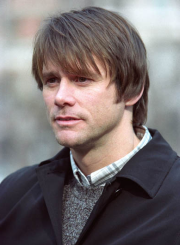
“Constantly talking isn’t necessarily communicating.”
Before Michel Gondry’s modern classic, few would have imagined Jim Carrey actually had a good actor inside him. But he managed to deliver a pitch perfect performance as the introverted Joel Barish alongside Kate Winslet’s impulsive Clementine. Gondry is the master of low-tech optical illusions and there are so many touches throughout the film, both large and small, meaning every frame is rich with visuals.
The writing is absolutely astounding, in terms of idea and characterisation (a shame that Kaufman hasn’t quite managed to match it yet), and, in a similar way to Chaplin, the film manages to combine furtive hope with heartbreaking sadness. A real study and revelation of relationships and the human condition.
“I’m simply saying that life, uh… finds a way.”
Ahh, Jurassic Park. I was the perfect age for this – four years old and in the midst of a dinosaur passion that would never really leave me. Okay, maybe four years old is a little young to appreciate many of the finer points of Spielberg’s classic, but I could see massive dinosaurs come to life and that was more than enough for me.
The cast is great (everyone loves an Attenborough), the dinos are brilliant but it’s the music that transforms this film from brilliant to outstanding. John Williams and Spielberg are obviously great pals, but for me the Jurassic Park theme is one of the greatest of all time, perhaps only surpassed by another Williams score that we’ll get to later… This was Hollywood at its greatest, before it turned to explosions and scantily clad women as its raison d’être. Jurassic Park 4 may now be in the works, and we should all keep our fingers crossed that it’s a return to the franchise’s roots.
6. The Lives of Others (Das Leben der Anderen)
“You are a great artist. Don’t you know that?” “And you are a good man.”
Before I’d even seen it, I harboured a great deal of prejudice against The Lives of Others, not because I didn’t think I’d like it, but because it beat Pan’s Labyrinth, my favourite film of that year, to the Best Film in a Foreign Language oscar. So for a short while I refused to watch it. Common sense got the better of me, and I’m so glad it did. The film offers a grim portrait of life in Stasi-controlled East Berlin during the mid eighties, focussing on an increasingly disenfranchised writer and a Stasi surveillance officer assigned to monitor him.
The more time Hauptmann Gerd Wiesler (brilliantly played by Ulrich Mühe) spends monitoring writer Georg Dreyman, the more he becomes involved in his life. The film sets itself out as a thriller, and indeed maintains this tension until the very end, but stands out from the rest because of its emotion and its characters. We care about their fate, and the ending almost moved me to tears, such was its understated but heartwarming beauty.
7. The Lord of the Rings: The Fellowship of the Ring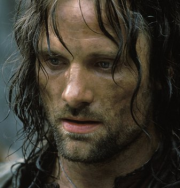
“One ring to rule them all…”
The Lord of the Rings series were the great event films of my early teenage years. Forget Harry Potter, these films were my generation’s Star Wars. I’d never seen anything so completely immersed in a world, so much detail and affection dedicated to a craft. The Fellowship holds the honour of my most watched film at the cinema: I forked out my own pocket money to see it four times.
While Return of the King offers unrivalled levels of epic as well as a resolution (lots of them) and The Two Towers properly introduced us to the wonder that was Andy Serkis’ Gollum, The Fellowship is where it all started. I can still remember the gleeful excitement of describing to my father the moment Aragorn chopped of the Lurtz’s head, and that kind of pure excitement is a rarity these days. Peter Jackson will never make a better film (though I’m hoping he’ll prove me wrong with The Hobbit) and I feel no shame that I’m able to quote almost the entirety of the film when I watch it. Although no one else seems to particularly appreciate that.
“Memory can change the shape of a room; it can change the color of a car. And memories can be distorted. They’re just an interpretation, they’re not a record, and they’re irrelevant if you have the facts.”
Memento has been one of my favourite films since I was about fifteen, and remains so. I have a theory that Christopher Nolan is actually quite hated in Hollywood – how can this random English guy make continually brilliant films and never seem to make any mistakes? He’s making everyone else look bad. I’m a fan of pretty much all of his films (and am of the rare opinion that The Prestige is probably a better film than Inception) but Memento was the first one I saw and I love its conceit.
For those who aren’t aware, Leonard Shelby (Guy Pearce) has a condition. He can’t make new memories. This is immediately interesting, but becomes even more engaging through Nolan’s filmmaking. The film is basically back to front. The beginning is the end and the finale is (chronologically speaking) the first thing that happens in the film. The scenes in colour run in reverse order (with a few seconds overlap just to helpfully remind us where we were) whilst the scenes in black and white run forward, the two strands meeting in the middle (the end). It sounds complicated but Nolan negotiates it skillfully, with style and humour and plenty of little touches to make repeat viewings even more rewarding.
9. One Flew Over the Cuckoo’s Nest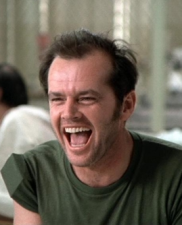
“But I tried, didn’t I? Goddamnit, at least I did that.”
This film contains one of my favourite scenes of all time. McMurphy (Jack Nicholson playing Jack Nicholson on speed) thinks he’s finally won a victory in his war against the intolerable Nurse Ratched after a vote to watch the World Series on TV. Ratched, however, refuses him the opportunity and McMurphy sits in front of the TV, dejected. All of a sudden his eyes light up, and he begins to comment on an imaginary version of the game. The other patients begin to gather round, confused at first but soon get caught up in the excitement. McMurphy is shouting now, “It’s a fucking home run!” and he jumps up and down in his seat as the noise rises and rises as the rest of them start cheering as well.
Nurse Ratched looks on from her little booth, helpless. She commands everyone over her microphone that they stop it at once, but they can’t be stopped and her face is one of increasing frustration. This moment embodies everything that McMurphy, and Nicholson, is all about. His unstoppable exuberance and determination in the face of cold, unfeeling institution. We have never been more on his side than at this moment, and it’s a real shivers-down-your-spine piece of cinema. It’s even almost enough to make you like baseball.
“My mother told me to be wary of Fauns.”
Pan’s Labyrinth is a fairytale typical of the remarkably creative mind of Guillermo del Toro. It’s far more Hans Christian Andersen than Disney, however, and whenever I watch it again I’m surprised at how dark it is. (A man gets beaten to death by a bottle for shooting rabbits…) The ambiguous mix between fantasy and reality works superbly as we follow a young girl Ophelia during the Spanish Civil War. She meets a faun, amongst other creatures, and embarks on a quest to try to save her unborn baby brother as well as prove her identity as a princess.
As well as beautiful visuals as you’d expect, the film offers exhilarating battle scenes as well as being steeped in metaphor. The Pale Man is surely one of the most unsettling characters ever committed to film, expertly brought to life by the perennial man in a suit, Doug Jones (who also plays the faun). The richness and beauty of the films aesthetic is often counterpointed by the brutality of reality (specifically Captain Vidal, the true epitome of a real bastard), making it a continually engrossing watch.
11. Raiders of the Lost Ark
“I don’t know, I’m making this up as I go.”
There are so many things that make Raiders of the Last Ark brilliant it’s hard to include them all. Let’s start with the most obvious: Mr Harrison Ford. I’m not a gay man, but put me face to face with Indiana Jones and anything could happen. Bringing in all his swagger from Han Solo and then some, Ford is the perfect embodiment of the reluctant action man. He’s so worldly (“It’s not the years, honey, it’s the mileage”) but becomes filled with childlike glee the moment something of archeological significance occurs. The moment when he simply takes his gun and shoots the flamboyant sword fighter is perfect, made even more so by the story behind it. Ford was suffering badly from dysentery and was due to film a complex and choreographed fight. “Why don’t I just shoot the fucker?” he asked Spielberg. So he did.
Like with Jurassic Park, this was a Hollywood film with no other agenda than to entertain. It doesn’t take itself seriously and it’s fantastic because of it. This is the main difference between Raiders and the Kingdom of the Crystal Skull debacle. But less of that. As I mentioned earlier, I love the Jurassic Park theme but only one other could beat it. I’m sure you’ve realised what that is by now. Da da da da… da da da… Williams’ rousing score for Indiana Jones breathes extra life into the film and captures all the joy and exuberance of the character and the film’s audience. I defy you to blast out the main theme and not feel a little bit happy because of it.
“The thing that makes Woody special, is he’ll never give up on you… ever. He’ll be there for you, no matter what.”
If anyone was still in any doubt as to whether Pixar made films just for kids (and I doubt there were many) this was shattered once and for all with the release of Toy Story 3. Again, I was the right age for Toy Story, and so the end of the third film was for me, like many other my age, a sort of watershed moment. The symbolic handover to the next generation was as moving as any serious drama, although the moment in the furnace was the one that really got me. If you’ve seen it, you’ll know what I’m talking about – I’m getting shivers just thinking about it – and the point when they all reach for a hand to hold without speaking a word is as gut-wrenching as it is brilliant.
As you’d expect, there’s also comedy a-plenty, not least with the introduction of Spanish Buzz, probably the most genius thing to happen, ever. Michael Keaton’s Ken is the other best newcomer, perfectly evoking the style and ethos of the strange man-dolls – “Sunnyside could be a really groovy place!” The issues that Buzz, Woody and the gang have to confront may fly merrily over the kids of the children watching, but for us grown ups (in age if not disposition) there’s plenty to mull over. On top of all this, the voice acting is spot on and the animation isn’t half bad either, making for a film as near to perfect as can be.
“Eeeee… va?”
The second and final animation in this list, and no surprises that it’s the folks at Pixar again. As soon as I learnt about WALL-E I was excited, not just because it was Pixar but because of the concept. A hero who is essentially a silent character, being able to utter little more than mispronounced names and the odd word here and there. Without a doubt, the best part of the film is the first 25 minutes or so, which are virtually completely silent. This was a bold move that the filmmakers didn’t have to take, but chose to try to push the boundaries as to what constitutes an animated “kids” films.
True to form, the opening was elegant, beautiful, funny and moving, bringing to mind Chaplin and the other silent heroes of the day (namely Buster Keaton). Obviously, this parallel was especially perfect for me, so much so that I wrote my dissertation about it in my final year as an undergrad. This entailed watching WALL-E multiple times, but to its credit I never got bored or fed up with it. The visuals are so carefully achieved and the emotions so strong that when I’ve watched it since, even though I’ve got a plethora of theoretical arguments and references running through my head, the story always takes over and I get lost in the adorable honesty and endurance of a cute little robot.
“You have to make the clitoris your best friend.” “What kind of friend is always hiding?”
I can’t remember how I came across this film, but it was the one that begun my passion for Mexican cinema. The story itself is simple: it’s a road movie. Two young men – or teenagers, depending on your outlook – Gael Garcia Bernal (one of my favourite actors) and Diego Luna embark on a trip across the country with an older woman, Maribel Verdú (also in Pan’s Labyrinth). They’re best friends and, like most teenage boys, highly sexed, resulting in the formation of a dangerous love triangle. The film explores themes concerning sex, friendships and ultimately life but in a far more ambiguous and thoughtful way than might be expected.
The key to why I love this film though, isn’t just the banter and fun between the characters. Every now and again throughout the film, a mysterious narrator speaks a few lines. It is unclear who he is – definitely not one of the characters – but he always reveals extremely specific and personal pieces of information about them. This certainty of information combined with the uncertainty of the speaker really underlines the tensions between the characters and within themselves, and makes us pause and consider more carefully what we’re seeing. A brilliant film, although definitely not one to watch with the family…
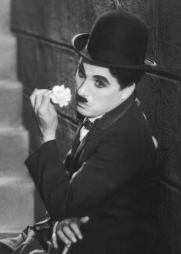
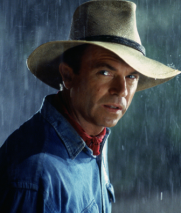
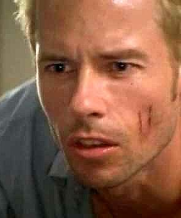
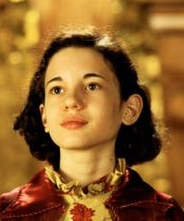
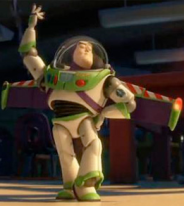
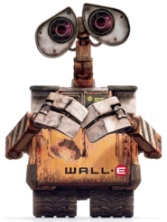
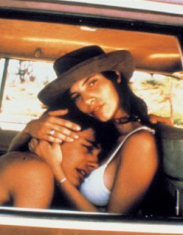
Pingback: Prometheus | This Affected Youth
Pingback: Prometheus brings the fire, though Alien proves the spark « Clicks and Hisses